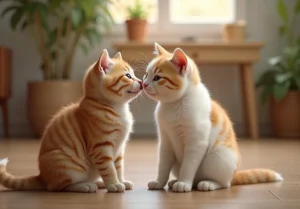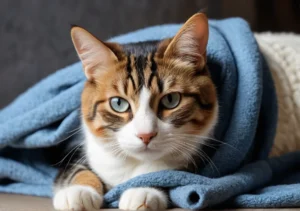Kittens nursing on male cats is a behavior that may seem puzzling at first glance. However, there are reasons behind this seemingly unusual behavior that may surprise you. Let’s explore why kittens exhibit this behavior and what it means in the world of feline biology.
Male cats often play a crucial role in the care and nurturing of kittens, even though they do not have the ability to nurse offspring themselves. Kittens nursing on male cats can serve several purposes, including forming bonds, establishing trust, and promoting a sense of security. This behavior is a testament to the intricate social dynamics within feline communities.
The role of male cats in kitten care
Male cats play a crucial role in the care and upbringing of kittens. They often provide warmth and protection to the young ones, creating a safe environment for them to thrive. Additionally, male cats are known to engage in grooming the kittens, keeping them clean and free from parasites. This grooming behavior not only helps maintain the kittens’ hygiene but also strengthens the bond between the male cat and the kittens.
Moreover, male cats also contribute to the socialization of kittens, teaching them important social skills that they will carry into adulthood. By interacting with male cats, kittens learn valuable lessons in communication, play, and hierarchy within the feline community. This early exposure to social interactions is essential for the kittens’ overall development and well-being.
One unique aspect of male cats’ involvement in kitten care is their ability to provide emotional support to the young ones. Male cats often exhibit nurturing behaviors, such as snuggling with the kittens and purring to comfort them. This emotional connection helps the kittens feel secure and loved, promoting their mental and emotional development.
In essence, male cats play a multifaceted role in kitten care, offering warmth, protection, grooming, socialization, and emotional support to ensure the well-being and growth of the young felines.
Biological factors influencing kitten behavior
The behavior of kittens nursing on male cats can be attributed to various biological and evolutionary factors. One key factor is the scent recognition that kittens develop from a young age. Kittens are known to associate the scent of their mother with nourishment and safety. When male cats interact with the kittens, they may pick up the mother’s scent, leading the kittens to seek comfort and sustenance from them as well.
Furthermore, the act of nursing on male cats can also be linked to survival instincts ingrained in kittens. In the wild, kittens rely on adults, including male cats, for food, protection, and guidance. Nursing on male cats may serve as a way for kittens to ensure their survival by forming connections with other members of their feline group.
Additionally, bonding is another crucial biological factor that influences kitten behavior towards male cats. Through nursing and other interactions, kittens form strong bonds with the male cats in their environment, creating a sense of belonging and security within the group.
By understanding these biological factors influencing kitten behavior, we can gain deeper insights into the complex dynamics of feline relationships and the innate drives that compel kittens to seek comfort and care from male cats.
Remember, each cat is unique, and the interactions between kittens and male cats can vary based on individual personalities and experiences.
Bonding between kittens and male cats
Nursing on male cats serves as a crucial bonding ritual for kittens, fostering strong connections within feline families. Through this act, kittens establish a sense of security and belonging, enhancing their overall well-being. Male cats, in turn, play a vital role in nurturing and caring for the kittens, creating a harmonious and supportive family dynamic. This bonding process helps build trust between the kittens and male cats, leading to a positive and enriching relationship that benefits both parties. Ultimately, the bond formed through nursing on male cats contributes to a healthier and more cohesive feline family unit.
Significance of trust and security in kitten development
Trust and security play pivotal roles in the early development of kittens, shaping their emotional well-being and overall growth. Nursing on male cats provides kittens with a sense of comfort and safety, instilling in them a feeling of trust in their surroundings. This act helps kittens develop a strong foundation of security, allowing them to explore and learn with confidence. By seeking nourishment and warmth from male cats, kittens establish a deep sense of attachment and reliance, essential for their emotional and psychological development. The trust and security built during this critical stage of kittenhood are vital for their long-term happiness and stability.
- Create a Safe Environment: Ensure that the area where the nursing takes place is quiet and free from disturbances, providing a peaceful setting for kittens to bond with male cats.
- Monitor Interactions: Supervise the nursing sessions between kittens and male cats to ensure that they are positive and beneficial for both parties.
- Encourage Gentle Behavior: Encourage gentle and nurturing behavior in male cats towards the kittens during nursing sessions, fostering a loving and supportive environment for bonding.
By understanding the significance of trust and security in kitten development and recognizing the role that nursing on male cats plays in this process, cat owners can support the healthy growth and well-being of their feline companions.
Common misconceptions about kittens nursing on male cats
One common misconception is that kittens nurse on male cats because they are hungry. In reality, kittens often nurse on male cats as a way to bond and form social connections. It’s more about comfort and security than actual hunger.
Another misconception is that male cats may reject kittens nursing on them. Male cats can actually be quite nurturing and tolerant towards kittens nursing on them. It’s a natural behavior in the feline world that helps strengthen relationships within the cat family.
A third common misconception is that kittens only nurse on their mothers. While mother cats are typically the primary source of nursing for kittens, male cats can also play a supportive role in caring for and nurturing kittens in their family group.
It’s essential to understand that kittens nursing on male cats is a natural behavior that serves a valuable purpose in cat social dynamics. By dispelling these misconceptions, we can appreciate the beauty and complexity of feline relationships even more.
Practical implications for cat owners
Provide a safe environment: Make sure your male cat has a quiet, comfortable space where kittens can nurse without feeling stressed or disturbed. This will create a positive experience for both the kittens and the male cat.
Monitor interactions: Keep an eye on how the kittens and male cat interact during nursing sessions. Ensure that the male cat is comfortable and not showing signs of aggression or discomfort. If any issues arise, intervene in a gentle and supportive manner.
Balance socialization: While it’s great for kittens to form bonds with male cats through nursing, ensure they also spend quality time with their mother for proper nourishment and care. A balanced socialization approach will benefit the kittens’ overall development.
Consult a veterinarian: If you have any concerns about the nursing behavior between kittens and male cats, don’t hesitate to seek advice from a veterinarian. They can provide professional guidance tailored to your specific situation.
By following these practical tips, cat owners can promote harmonious interactions between kittens and male cats, fostering a nurturing and supportive environment for their feline companions.
Fun facts about feline behavior
Cats are known for their unique behaviors, and one interesting fact is that kittens may nurse on male cats. This behavior is actually a form of comfort-seeking, as kittens may nurse on any available surface that feels warm and soft, resembling their mother. So, if a male cat is around and provides a cozy spot, kittens may instinctively nurse on them.
Another fun fact is that cats have a strong sense of smell, with a whopping 200 million scent receptors in their noses. This keen sense of smell helps them navigate their environment, identify familiar scents, and even communicate with other cats through scent marking.
Interestingly, cats are crepuscular, meaning they are most active during dawn and dusk. This behavior stems from their natural hunting instincts, as these are the times when their prey is most active. So, if you see your cat being extra playful in the early morning or evening, know that it’s just following its instinctual behavior.
In addition, cats are obligate carnivores, which means they require a diet rich in animal protein to thrive. This is why offering your feline friend high-quality cat food with a meat-based protein source is crucial for their overall health and well-being.
Insightful Tip: Cats are known for their grooming rituals, but did you know that grooming not only keeps their fur clean but also helps them regulate their body temperature? So, the next time you see your cat grooming itself, know that it’s not just about hygiene but also a way for them to stay cool or warm as needed.
Remember, every cat is unique, so their behaviors can vary based on their individual personality and experiences. Enjoy observing your feline friend’s quirky habits and remember that each behavior has its own fascinating purpose in the feline world.
Alex, a passionate animal lover, has experience in training and understanding animal behavior. As a proud pet parent to two dogs and three cats, he founded AnimalReport.net to share insights from animal experts and expand his knowledge of the animal kingdom.




